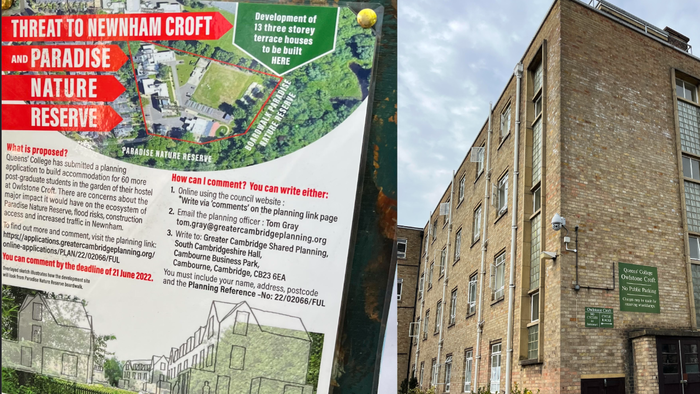Student petition calls to stop Queens’ new accommodation plans
The students behind the petition fear that the development will cause a loss to biodiversity, but others claim that objections to the development are unfounded

A petition written by students at Queens’ College has been put forward to stop the construction of more student accommodation in Owlstone Croft, an accommodation block near the Paradise Nature Reserve.
The college’s plans would see the building of four new blocks of postgraduate accommodation to house an additional 60 postgraduate students. The college’s nursery on the site would also be demolished.
The petition, which has sixty signatures at the time of writing, opposes the development on environmental grounds, claiming that the plans “pose a significant threat to biodiversity”.
The petition also claims that the planned drainage system for the development will flood the nature reserve. The writers of the petition are also concerned that trees will be cut down that act as a habitat for endangered bats.
One of the petition’s organisers told Varsity that the petition was for “Owlstone students who felt like this decision didn’t represent their interests”.
They added that they “feel it’s important that the priority of this discussion is given to the preservation of the biodiversity in the nature reserve, as it’s a space that matters just as much to students as city residents.”
Despite some support for the petition within the college, it has not been without backlash. One Owlstone resident told Varsity: “Cambridge is rapidly becoming one of the most unaffordable cities in the country due to a chronic undersupply of housing, and this crisis hurts young people and low-income residents most.”

They continued: “This petition is indicative of the culture of NIMBYism behind the crisis. The ‘environmental’ objections to the development are unfounded (the proposal addresses ecological concerns). To the contrary, during simultaneous climate and energy crises, modern energy efficient accommodation within a 5 minute cycle of the city centre should be welcomed by environmentalists.”
Another of the petition’s writers hit back against the claim that the development would aid in the nation’s housing crisis. They said: “University accommodation is not rent stabilised, and it is understood that more student accommodation increases housing alienation for Cambridge residents in general. There is already a disproportionate homeless population in the city that is exacerbated as a result of university housing.”
The student run petition follows a similar petition written by the group Friends of Paradise Nature Reserve, a group dedicated to the protection of the site.
The development has also faced opposition from the neighbouring Newnham Croft primary school, with pupils at the school making banners to protest the threat to biodiversity and air pollution resulting from the construction site.
Queens’ College had previously scaled back its plans for the new accommodation in light of concerns about the nature reserve. A Biodiversity Net Gain assessment concluded that the proposed development would actually lead to a 51% gain in biodiversity through the creation of new habitats such as grassland.
The College website for the proposal claims: “By incorporating elements of the neighbouring nature reserve into the site, such as wetland and woodland features, the landscape plan has integrated the character of surrounding natural features.”
A representative for Queens JCR told Varsity: “Queens’ JCR have seen the petition by Friends of Paradise and take seriously the feelings of students who might have concerns about developments at Owlstone Croft. At the beginning of Lent term, we are exploring the possibility of providing an open forum for students with concerns to communicate them to the Queens’ senior officers, and for Queens’ to be able to provide answers and responses to those concerns”.
In an update in October, the college said that they "commissioned additional assessments to address concerns about the impact of lighting on biodiversity and the adjacent nature reserve. The solutions have been developed in close discussion with officers at the City Council as part of a comprehensive consultation process on design and technical matters."
 Features / Should I stay or should I go? Cambridge students and alumni reflect on how their memories stay with them15 December 2025
Features / Should I stay or should I go? Cambridge students and alumni reflect on how their memories stay with them15 December 2025 News / Cambridge study finds students learn better with notes than AI13 December 2025
News / Cambridge study finds students learn better with notes than AI13 December 2025 Comment / The magic of an eight-week term15 December 2025
Comment / The magic of an eight-week term15 December 2025 News / News In Brief: Michaelmas marriages, monogamous mammals, and messaging manipulation15 December 2025
News / News In Brief: Michaelmas marriages, monogamous mammals, and messaging manipulation15 December 2025 News / Uni Scout and Guide Club affirms trans inclusion 12 December 2025
News / Uni Scout and Guide Club affirms trans inclusion 12 December 2025










